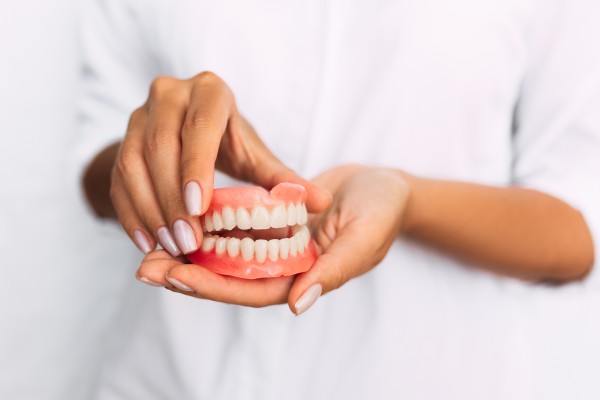Types of Dentures
Dentures are a great tooth replacement option for you if you want an affordable, attractive solution for your tooth loss.
Here at Kevin J. Curtin, DDS, we offer three types of dentures, partial, complete, or implant-supported dentures. Partial dentures are used when you have some teeth missing, but not all. These dentures are anchored to neighboring teeth or held in place using adhesives.
Complete dentures are used when most or all of the teeth in an arch are missing. They can be used on the top and bottom arches and are usually held in place using adhesives. Traditional dentures are generally a more affordable option for patients, however, they don’t offer as many benefits as an implant denture does.
Implant-supported dentures use dental implants to provide optimal support and stabilization for your traditional denture piece. This option helps regenerate lost bone in the jaw, eliminates a sliding denture when eating, and can be easily removed for cleaning.

Are Dentures Right for Me?
Dentures have been used for many years. If you want a long-lasting, affordable solution to replace your missing teeth, then dentures are right for you.
They help people eat, speak, and smile normally again. Modern dentures are designed to fit your mouth better and are far more comfortable to use and wear.
Our attractive dentures will also help you feel more confident to smile again. You’ll no longer have to hide behind your hand.
How Do I Take Care of My Dentures?
Dentures need to be brushed like natural teeth. Make sure to use a toothbrush that is specially designed for dentures. Using abrasive materials such as harsh or whitening toothpaste, strong cleansers, or stiff-bristled brushes can scratch and damage your dentures.
After your dentures have been cleaned, and before heading to bed, they need to placed in a soaking solution. Removing them every night allows your gums to rest while you sleep. Taking these steps will help extend the life of your dentures.
How Long Do Dentures Last?
Typically, dentures last between eight and ten years. Your jaw naturally changes over time, and adjustments may be needed to ensure that your dentures continue to fit properly.
To help maintain your oral health and to help your dentures last longer, we recommend you visit our office at least twice a year for your regular biannual check-ups.

Denture FAQs
My current pair of dentures are loose or ill-fitting, what are my options?
If your denture becomes loose, you should give us a call to come in so we can fix them.
We might also like to suggest a more stable and secure solution with implant-supported dentures, that way your denture can fit comfortably in your mouth
My dentures broke, how do I fix them?
If your denture breaks, take it out and bring it in so we can repair it.
Does my dental insurance cover dentures?
Most dental insurance providers will cover a portion of restorative treatments. It’s best to speak with your company and see what their policies are before moving forward with it.
What are dentures made of?
Your denture is made of safe, comfortable acrylic material, designed to match the beauty of your natural smile.
How do I clean my dentures? How do I remove staining?
Each night you should brush your dentures and soak them in the solution we provide to you for 30 minutes.
To remove deep stains on your denture set, try mixing vinegar and water to cleanse them. Then, brush them thoroughly afterward.
How can dental implants improve my experience with dentures?
Dental implants can help provide maximum stability and comfort with your dentures. Since dental implants integrate with your jawbone, your denture will no longer slide around.
Additionally, it will prevent further bone loss and make you feel more confident than ever before.
Have Further Questions About Dentures?
If you have any questions about dentures or need help with dentures that don’t fit right, schedule a visit with Dr. Curtin.
We can help you get back to the life you want to live, rather than the one where you’re constantly worrying about your smile. Give us a call or schedule below.


